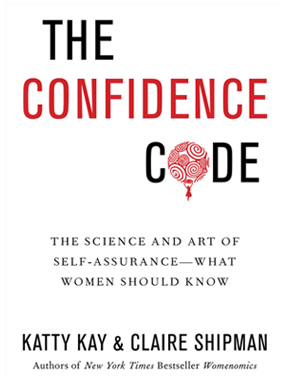An examination of how women can gain confidence and take action.
Reviewed by Allan Fallow

Optimism, people skills, networking — books offering to help businesswomen master these attributes are legion. But a much more potent quality — confidence — is in such “alarmingly short supply” that it has become “a force clearly holding us back.”
That’s the provocative premise of The Confidence Code by TV journalists Katty Kay and Claire Shipman, who spent 20 years individually covering American politics before they teamed up to write Womenomics in 2008. In their new book, the two women confess the shock they felt upon realizing “the full extent to which the power centers of this nation are zones of female self-doubt.” Dubbing this disparity a “confidence gap,” they have produced this blueprint for female self-assurance revealing how and why confidence outweighs competence as an ingredient for success. Part manifesto and part parenting manual (no mother of a teen daughter can afford not to read it), The Confidence Code urges women to “start acting and risking and failing and stop mumbling and apologizing and prevaricating.”
Kay and Shipman traveled the globe to compile their confidence code, interviewing everyone from International Monetary Fund head Christine Lagarde to New York Senator Kirsten Gillibrand to storied feminist Marie Wilson. (The latter told them, disconcertingly, “When a man looks in the mirror, he sees a senator staring back. A woman would never be so presumptuous.”) They started out in their own backyard — the Verizon Center in Washington, D.C., home of the WNBA’s Washington Mystics — because they wanted to observe grown women “working together mostly in isolation from men, which takes away a major confidence inhibitor,” write Kay and Shipman. (If you doubt that dynamic, check out the 2012 Princeton study documenting that when women are in the gender minority, they speak up as much as 75 percent less than men do.)
While interviewing star Mystics players Monique Currie and Crystal Langhorne (who encouraged Shipman’s young daughter, Della, to shoot a few confidence-building hoops with them), The Confidence Code authors notice some disturbing traits that they say are common to almost all professional women: overthinking, people pleasing and an inability to let go of defeats, for starters. These earn a place of shame on their “confidence blacklist,” along with hesitation, perfectionism and attributing one’s success to luck rather than skill. By the time we meet the (male) senior partner of a law firm who concludes that confidence ratings should be a formal part of performance reviews, we’re bobbing our heads in agreement.
If The Confidence Code occasionally feels like a cry of anguish — “[W]hat a waste of energy and talent all of this agonizing can be” — it is also a call to action. Not action for the sake of busyness, mind you, but action as a deliberate tactic for boosting one’s self-assurance. Tackle one new thing and the progress you make will whet your appetite for challenge; master that new thing and the entire process may prove contagious, emboldening you to seek out and face down some new test.
The authors’ level-headed advice on raising confident daughters makes me want to shove a copy of The Confidence Code into the hands of every graduating senior along with her diploma — or better yet, every girl starting ninth grade. As Kay and Shipman themselves put it:
“We both spent too much of our 20s and 30s stuck in self-doubt, and yes, we both still devote too much time to internalizing setbacks. … For the sake of their own sanity and happiness, young women have to find a way to interrupt that negative soundtrack — much sooner, we hope, than we’ve been able to.”
From Classroom to Cubicle
Speaking of girls and school, that’s precisely where The Confidence Code authors believe much female insecurity arises. Better able than boys to behave in the classroom — and rewarded for doing so — girls learn to avoid taking risks and making mistakes. But that is just the sort of trial-and-error, real-world experience they must log to gain confidence in their own abilities. It will also stand them in good stead once they leave the “meritocratic academic classroom where we excel” and enter the hard-knocks job market: “Professional success demands political savvy, a certain amount of scheming and jockeying, a flair for self-promotion and not letting a ‘no’ stop you,” write Kay and Shipman. “Women haven’t been very good at mastering these skills, and that holds us back.”
The playground or ball field turns out to be an ideal place to replenish a young woman’s confidence reserves. As Title IX studies have proven, girls who play team sports are more likely to finish college and earn a higher salary. Yet the CDC has found girls six times more apt to drop off a sports team than boys. Moral of the story? To build the more confident woman of tomorrow, don’t let your sophomore quit the lacrosse team today!
So much for what the world around them is doing to sap women’s self-assurance; might they also be doing something to themselves to widen the confidence chasm? The authors are particularly hard on their own gender here, assailing what they see as distinctly female tendencies to:
- find fault with their own appearance;
- prize being liked over being respected;
- personalize setbacks;
- dwell on problems at the expense of solutions;
- overvalue emotional connections; and
- overthink things to such a degree that they undermine themselves with “tortured cycles of useless self-recrimination.” This is the opposite of taking action — that “cornerstone of confidence,” as the authors characterize it — and it’s so pervasive that psychologists have coined a formal word for it: ruminating. “We do a lot more ruminating than men,” write Kay and Shipman, “and we have to get out of our heads if we want to build confidence.”
Me, I’m just grateful for the opportunity The Confidence Code gave me to get inside the heads of these two sharp thinkers. Their new book is so rich in life lessons to ruminate over that it makes a worthy rival to Sheryl Sandberg’s Lean In.








